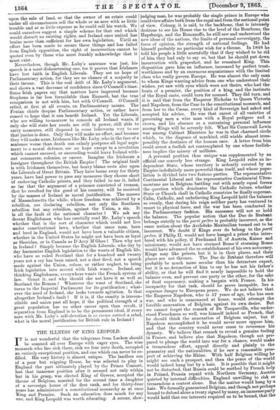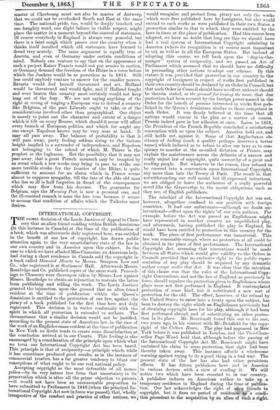Mei ILLNESS OF KING LEOPOLD.
IT i not wonderful that the telegrams from Laeken should be scanned all over Europe with eager eyes. The wise monarch who lies sick there, sick we fear unto death, occupied an entirely exceptional position, and one which can never be re- filled. His very history is almost unique. The landless son of a poor but reigning House, he was selected to play in England the part ultimately played by the Prince Consort, lost that immense position after it seemed not only within but in his grasp, was elected King of Greece, accepted the throne of Belgium, married for the second time a daughter of a sovereign house of the first rank, and for thirty-four years has administered a constitutional monarchy as at once King and Premier. Such an education does much for any one, and King Leopold was worth educating. A serene, slow- judging man, he was probably the single prince in Europe who could view affairs both from the regal and from the national point of view. Coburg, it is said, to the backbone, that is intensely desirous to see his House rise to the level of the Bourbons, the Hapsburgs, and the Romanoffs, he still saw and understood the new ideas of the nations, the limits of personal sovereignty, the force of opinion, the strength of national feelings. He haa himself probably no particular wish for a throne. In 1848 he told his people a little scornfully that if they wished to be rid of him they had only to say so, but that he should put down insurrection with grapeshot, and he remained King. This disposition gave him an influence, increased by perfect trust- worthiness and by an enormous acquaintance with the limited class who really govern Europe. He was almost the only man to whom Kings wanting advice from one who understood their wishes, yet saw with eyes which were not theirs, who had the brain of a premier, the position of a king, and the instincts. of the Royal caste, could turn for counsel. They did turn, and it is said that from the Emperor Nicholas to Queen Victoria and Napoleon, from the Czar to the constitutional monarch, and from her to the Caesar, every kind of Sovereign had asked and accepted his advice. He was that rarest of all varieties of governing men a wise man with a Royal pedigree and a crown, and his absence as a restraining personal influence among Kings will be severely felt. What Sir Cornewall Lewis was among Cabinet Ministers he was in that charmed circle which, to the disgrace of mankind, still wields almost irres- ponsibly the destinies of the human race. A letter from him could arrest a foolish act contemplated by one whose foolish- ness implies the misery of millions.
A personal position thus unique was supplemented by an official one scarcely less strange. King Leopold rules an in- dependent State, whose territory is ardently coveted by an Empire indefinitely more powerful than itself, and whose popu- lation is divided into two furious parties. The representative Continental Liberal and the representative Continental Ultra
montane are in Belgium battling out with nearly equal forces the question which dominates the Catholic future, whether State or Church shall in Catholic countries be finally supreme. Calm, Catholic, and unbelieving King Leopold held the balance so evenly, that during his reign neither party has ventured to resort to physical force, and the war has been conducted in the Parliamentary fashion. His successor will not so hold the balance. The popular notion that the Duo de Brabant belongs strictly to the parti pritre is probably incorrect, as the same notion about the Archduke Malrimilian turned out to be incorrect. We doubt if Kings ever do belong to the parti pt4tre, if Philip H. would not have hanged a priest who inter- fered with his policy, if Ferdinand II. of Austria, Kaiser and missionary, would not have stormed Rome if storming Rome would have advanced the re-establishment of his own autocracy. Kings may like priests, but it is in their places, and their phees are not thrones. The Due de Brabant therefore will probably be much more secular than his detractors expect, but it is no detraction of him to say he has not his father's ability, or that he will find it nearly impossible to hold the balance even, and prevent one party or the other, .for the sake of final supremacy, making a bargain with France. In his incapacity for that task, should he prove incapable, lies a supreme danger to European peace. We do not believe that the Emperor Napoleon, who is 57 years of age, who has seen war, and who is unmenaced at home, would attempt the forcible annexation of Belgium against its own desire. But we cannot forget the remark of De Toequeville, who under- stood Frenchmen so well, was himself indeed so French, that he should think the annexation of Belgium unjust, but if Napoleon accomplished it he would never more oppose him, and that the country would never cease to reverence his dynasty. We believe that remark to reveal a genuine feeling in France, and believe also that Napoleon, though not pre- pared to plunge the world into war for a chance, would make a tremendous effort, appeal directly and plainly to the peasantry and the nationalities, if he saw a reasonable pros- pect of achieving the Rhine. With half Belgium willing he might see such a prospect, and then the peace of the world would indeed hang but by a hair. It is possible that it might not be disturbed, that Russia could be soothed by French help in Poland, Prussia repaid with Northern Germany, Austria quieted by internal difficulties, England unwilling to risk so tremendous a contest alone. But the matter would hang by a hair. We formally guaranteed Belgium, and though not perhaps bound to defend alone a treaty signed by many, an immenseparty would hold that our interests required us to be bound, that the master of Cherbourg must not also be master of Antwerp, that we could not be overlooked South and East at the same time. The national pride, too, would be deeply touched, and one haughty word, one slight failure in visible respect, might place the matter in a moment beyond the control of statesmen. Of course everybody in England is always very peaceful, but there is a faint sough which passes over the country when it thinks itself insulted which old statesmen have learned to dread very acutely. The same argument is equally true of Austria, and even of Germany under certain conditions of mind. Nobody can venture to say that on the appearance of such a project Kaiser Francis would not put armies in motion, or Germany demand the freedom of the Rhine in a voice before which the Junkers would be as powerless as in 1814. Still less could anybody venture to answer for the smaller powers. Bavaria would feel herself threatened and act, Holland would be threatened and would fight, and if Holland fought and were beaten this country most certainly would not keep long out of the fray. We are not saying anything of the right or wrong of waging a European war to defend a country like Belgium, of the part Liberals ought to take, or of the considerations involved other than geographical. Our object is merely to point out the character and extent of a danger which is felt on every Bourse, which should it occur will affect every branch of European politics, and which for aught any one except Napoleon knows may be very near at hand. It may all pass away. The balance of probability is that it will pass away, party feeling seldom rising to the furious height implied in a surrender of independence, and Napoleon not belonging to the school of which M. Thiers is the prophet or the fugleman. But the possibility that it may not pass away, that a great French monarch may be tempted by an event which a few weeks may bring to pass to strike one more terrible stroke for the frontier of the Rhine, is quite sufficient to account for an alarm which in France seems almost to suppress sympathy, till the fate of the able old man who lies so ill is half forgotten in dread of the consequences which may flow from his decease. The guarantee for Belgium, says the Morning Post, is now a personal one, and the ill-omened remark is none the less true because it seems to assums that condition of affairs which the Tuileries most desires-



































 Previous page
Previous page